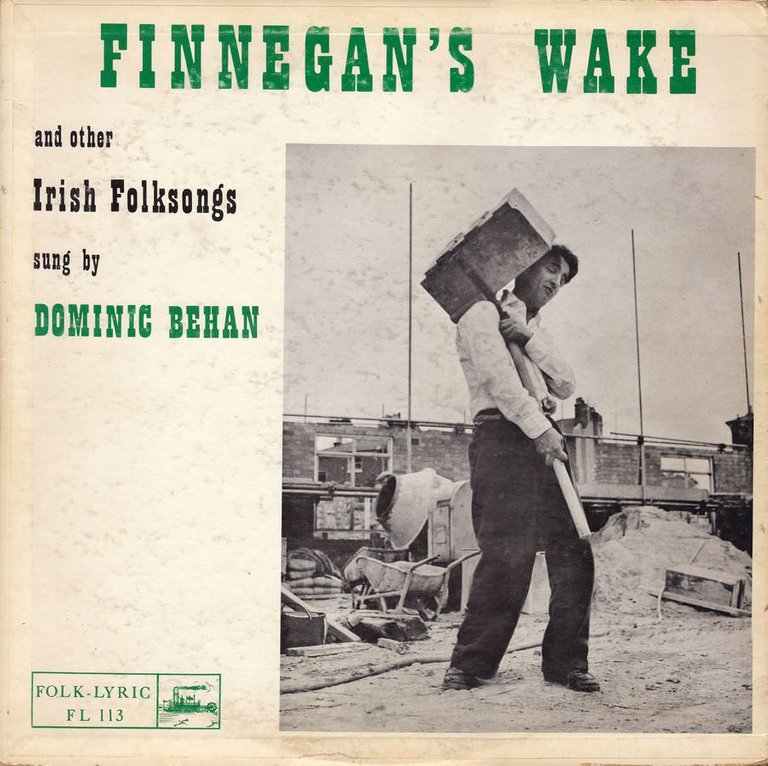
In the preceding article in this series, I tried to trace the iconic Irish-American ballad Finnegan’s Wake back to its roots, but without complete success. After posting that article to Steemit, I discovered some new facts that entailed a few hasty edits before the editing window closed. This article is an attempt to bring a little clarity to what has become a very confusing state of affairs.
In summary, my researches have turned up three slightly different versions of the song, any one of which could be the original:
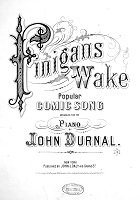
- Durnal Version Finigans Wake, published in New York by John J Daly in an arrangement by John Durnal. The date on the front cover of the sheet music is 1854, but on the second page of the score the date is given as 1864. The latter, I now believe, is the correct date. Finnegan’s Wake was in vogue in the mid-1860s. I have not been able to find any references to it between 1854 and 1864. And all the musical arrangements by John Durnal that I have found are dated to 1863-76. On the other hand, John J Daly was publishing music in New York since at least 1849, and the engraver George W Quidor was certainly active in the early 1850s.
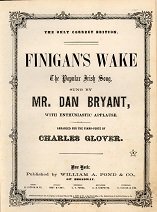
- Bryant-Glover Version Finigan’s Wake, published in New York by William Pond & Co in an arrangement by the English composer Charles William Glover. The work is described on the cover of the sheet music as The Only Correct Edition, which suggests that a rival edition was already in print. The byline reads: The Popular Irish Song, Sung by Mr Dan Bryant, with Enthusiastic Applause. We do know that Dan Bryant of Bryant’s Minstrels sang the song in Mechanic’s Hall on Broadway on 18 February 1864, according to the surviving Playbill. The date on the sheet music is 1864. This version of the song also appeared in the same year—allegedly with the publisher’s permission—in Beadle’s Dime Song Book No. 13. The publishers, Beadle and Company, acknowledged Wm Pond & Co as the owners of the copyright, but they still managed to omit the song’s final climactic stanza!
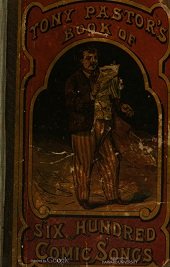
- Poole Version Tim Finigan’s Wake, By John F. Poole, As Sung by Tony Pastor, Air: “The French Musician”. This version was published by Dick & Fitzgerald in New York in Tony Pastor’s Book of Six Hundred Comic Songs and Speeches. The date, 1867, is relatively late, but I have since discovered that this version of the song appeared in print as early as 1864 in Bryants’ New Songster, where it bears the title Tim Finigan’s Wake, with the byline As sung by Bryants’ Minstrels, though of course it is not the version sung by Dan Bryant. Obviously Poole must have written his version of the song no later than 1864. However, it does not appear in Tony Pastor’s Complete Budget of Comic Songs, which Poole edited and which was published in 1864.
Some Points to Note
1864 seems to be emerging as a pivotal year in the early history of Finnegan’s Wake—especially if we discount the anomalous 1854 on the cover of the Durnal Version.
The Bryant Version’s The Only Correct Edition may have been a response to the appearance of Bryants’ New Songster, which includes the Poole Version but describes it incorrectly As Sung by Bryants’ Minstrels. It is obvious that Bryant’s Minstrels were not involved in the publication of this song book, which misspells the name of their troupe.
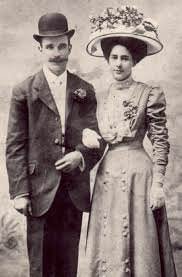
The original version of Finnegan’s Wake must go back to 1863 at the latest. The arranger of the Bryant-Glover Version, Charles William Glover, died on 23 March 1863. Obviously he cannot have arranged Finigan’s Wake after that date. This gives us a terminus ante quem for the creation of the song.
Or does it? The Dictionary of National Biography tells us that C W Glover was born in 1806 and died in 1863, but I have come across other sources that claim he was born in 1797 and died in 1868! For example, the Choral Public Domain Library. The Irish songwriter and composer Samuel Lover lived from 1797 to 1868, so perhaps this is the source of the confusion: Lover, Glover? The Cyclopedia of Music and Musicians supports the DNB:
GLOVER, CHARLES WILLIAM, born in London, February, 1806, died there, March 23, 1863. Violinist, pupil of T. Cooke; was engaged at the Drury Lane and Covent Garden Theatres; musical director of Queen’s Theatre, 1832. Has composed songs, duets, and pianoforte music. (Champlin & Apthorp 157)
That settles it.
John F Poole
John F. Poole, who is credited with writing the words of the version popularized by Tony Pastor, may have only begun his career in the theatre in 1863 (Fields 44). This would reduce his chances of being the true creator of the song, but it would not extinguish them completely. Accurate biographical information on Poole is sorely lacking, and the situation is not helped by the similarity of his name to that of the contemporary English playwright John Poole (1786-1872).
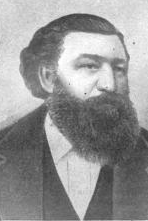
We know that John F Poole died on 17 July 1893—the event was widely reported in the newspapers at the time—but we do not know the exact year of his birth. According to Armond Fields he was born in 1833. His obituary in The New York Times (18 July 1893), however, gives his age as fifty-eight (Meehan 69), which implies that he was born in 1834-35. And his obituary in The Sun reports his age as fifty-four, which would put his birth in 1838-39.
Several sources—Fields and newspaper obituaries—state that Poole came to America when he was twelve years old. It so happens that in the National Archives of the United States there is a record of a twelve-year old boy called John Poole arriving in New York from Dublin on the Famine ship Fag an Bealac [Fág an Bealach, Irish for Get Out of the Way!] on 17 May 1847. So John F Poole was indeed born in 1835, and he was 58 at the time of his death. Score one for The New York Times.
Armond Fields claims that Poole only embarked on a career in theatre at the age of thirty (1863 according to Fields’s chronology), but Fields was wrong when he told us that Poole was born in 1833 so why should we believe him now?
Jane Meehan cites George Odell’s Annals of the New York Stage to the effect that Poole first made a name for himself with his drama Nick Wiffles in 1858:
According to The Annals of the New York Stage (Columbia University Press, Vol. VII, p. 134), Poole was a leader among popular dramatists of the day at least by 1858, when ‘Nick Wiffles’ [sic], his successful ‘scout and indian drama’ was presented at the Bowery Theatre on 23 August. The following season, he was named ‘chartered dramatist’ of the New Bowery Theatre, opened by the previous managers of the original Bowery. Poole operated at a frantic pace; between 10 September and 9 November of the 1858 season, he was credited with seven productions (Meehan 69)
Nick Whiffles was a fictional American frontier character created by John Hovey Robinson in a serial that ran in the New York Weekly in the summer of 1858. A very successful melodrama based on the serial was premiered in 1858 and became the most widely performed frontier play prior to the American Civil War, but I have not been able to confirm that this particular melodrama was written by Poole. Roger A Hall, Performing the American Frontier, 1870-1906, refers to it as “John Hovey Robinson’s Nick Whiffles” (Hall 31). Rosemarie Bank mentions “several versions of Nick Whiffles, the most successful probably J. H. Robinson’s in 1858” (Bank 152)
Nevertheless, there is solid evidence that Poole was active on the stage by 1858 or 1859:
An even more prolific playwright who worked hard to feed the insatiable appetites of American theatre managers and their audiences was Dublin-born John F. Poole (1835-1893) ... John F. Poole came to America when he was twelve years old, graduated from St. John s College and by 1859, according to Odell, was the chartered dramatist of the Old Bowery theatre in New York, a young man of twenty-four years. From the opening of the fall season in August through November, 1859, Poole adapted or wrote eleven plays for this theatre, and this was only the beginning of his prolific career. Among his plays are The Venetian Buccaneer (1859, a story by Cobb); The Privateer and the Pirate; or, Our Country’s Flag (1859); The Massacre of Wyoming (1859); Santa Claus; or, A Christmas Dream (1862); Cudjo’s Cave (1864, adaptation of a Trowbridge novel); The Bounty Jumper of the Bowery (1865); The Ballet Girls of New York (1868), and Di-vorce (1872). (Meserve 16-17)
Poole’s Excelsior, or Life’s Struggles was produced on the stage at Chatham Theatre, New York, on 27 February 1858 (Brown 328). The Cambridge Guide to American Theatre even goes so far as to claim that Poole was house dramatist at the Old Bowery Theatre by 1852, when he was just seventeen years old (Wilmeth & Miller 312).
If Poole was already active in the music-hall industry before 1860, then his claim to the authorship of Finnegan’s Wake cannot be dismissed out of hand. Meehan, who first identified him as the author in 1976, may have been right after all.
John Durnal
If information on John F Poole is sorely lacking, in the case of John Durnal it is all but non-existent. I have been unable to learn anything substantial about this man or his career. When and where was he born? When and where did he die? Was he married? Did he have any children? What did he look like? All we know is that he was an arranger and composer of popular songs in New York in the 1860s and ’70s.
Impasse
We seem to have reached an impasse. Unless new information comes to light, the only course to take is to examine the lyrics and music of the different versions and see if any conclusions can be drawn from them.
References
- Rosemarie Bank, Frontier Melodrama, in Dunbar H Ogden (editor), Theatre West: Image and Impact, Rodopi, Amsterdam (1990)
- Beadle and Company, Beadle’s Dime Song Book No. 13, Beadle & Company, New York (1864)
- Thomas Allston Brown, A History of the New York Stage from the First Performance in 1732 to 1901, Volume 1, Dodd, Mead & Company, New York (1903)
- John Denison Champlin, William Foster Apthorp (editors), Cyclopedia of Music and Musicians, Volume 2, Charles Scribner’s Sons, New York (1889)
- Robert M De Witt, Bryants’ New Songster: Comprising a Careful Selection of the Newest and Most Popular Sentimental and Comic Songs, Lately Introduced by the Bryant Brothers, Robert M De Witt, New York (1864)
- Armond Fields, Tony Pastor, Father of Vaudeville, McFarland & Company, Incorporated, Jefferson NC (2007)
- Roger A Hall, Performing the American Frontier, 1870-1906, Cambridge University Press, Cambridge (2001)
- James Joyce, Finnegans Wake, The Viking Press, New York (1958, 1966)
- Sidney Lee (editor), Dictionary of National Biography, Volume 22, The Macmillan Company, London (1909)
- Jane S Meehan, Tim Finigan’s Wake, A Wake Newslitter, Volume 13, Number 4, pp 69-73, University of Essex, English Department, Colchester (1976)
- Walter J Meserve, Our English-American Playwrights of the Mid-Nineteenth Century, The Journal of American Drama and Theatre, Volume 1, Number 1 (Spring 1989), CUNY, New York (1989)
- George C D Odell, Annals of the New York Stage, Volume 7 (1857-65), Columbia University Press (1931)
- Tony Pastor, Tony Pastor’s Book of Six Hundred Comic Songs and Speeches, Dick & Fitzgerald, New York (1867)
- Danis Rose, John O’Hanlon, The Restored Finnegans Wake, Penguin Classics, London (2012)
- Don B Wilmeth, Tice L Miller (editors), Cambridge Guide to American Theatre, Cambridge University Press, Cambridge (1996)
Image Credits
- Finnegan’s Wake (Dominic Behan): © Folk-Lyric Records, Fair Use
- Finigans Wake: Lester S Levy Sheet Music Collection, Public Domain
- Finigan’s Wake: Duke University Libraries, Public Domain
- Tony Pastor’s Book of Six Hundred Comic Songs and Speeches: Hathi Trust Digital Library, Public Domain
- C W Glover: IMSLP, Petrucci Music Library, Public Domain
- John F Poole: Public Domain
Useful Resources
- American Minstrel Show Collection
Libraries, Digital Collections - Joyce Tools
- FWEET
- The James Joyce Scholars’ Collection
- FinnegansWiki
- Annotated Finnegans Wake (with Wakepedia)

good job, sir.... your informative post inspire me... @harlotscurse @upvote done
thanks for your sharing this types of information... i can gather many information from your post... @harlotscurse @upvote done
amazing information on your post...good job... @harlotscurse @upvote done
Magnificent contribution friend a great story I love reading is my passion thanks is a great contribution for all in this great community
When I hear the name of James Joyce I know it's a great story I'm his fan his dedication to write is unique is a world star thank you for sharing with us friend
Thank you so much for sharing such a great information in font of us.
Excellent post good article and photography dear @harlotscurse
great post dear @harlotscurse and good articel. very nice photography thanks for shere.
so 100% upvote. i well never forget you i always with you
it's a learning one for us..
thank you so much for sharing such literature..
like it dear..👍👍👍👍👍
thanks a lot dear @harlptscurse for sharing such an informative post.. @upvoted
i all time support your post
dear lovely friend @harlotscurse i just resteem your post
i love your post all time
your post is so informative sir,
@upvote done
wow..great post, my dear friend @harlotscurse,i like it this post all time,thank you for sharing with us,
Excilent post dear
very much ancient and informative literatur D:) @harlotscurse " i ♥ your all post " thank you for sharing this post"
i like your post so much... thanks for your informative post... @harlotscurse @upvote done
so much ancient & informative literature...
your sharing article, i love most...
love you dear.. thank you @harlotscurse
thanks for your informative post... keep it up @harlotscurse @upvote done
very much ancient and informative literatur D:) @harlotscurse " i ♥ your all post " thank you for sharing this post"
very well post and great writing thank you for sharing with us
thank you for sharing the valuable post
What an extraordinary good friend writing how good you are back with us your quality are your post
The fineegan,s wakes tunes is really so nice....
I just hear now from the Wikipedia. Thts Nice
The real fock song ever
excellent post